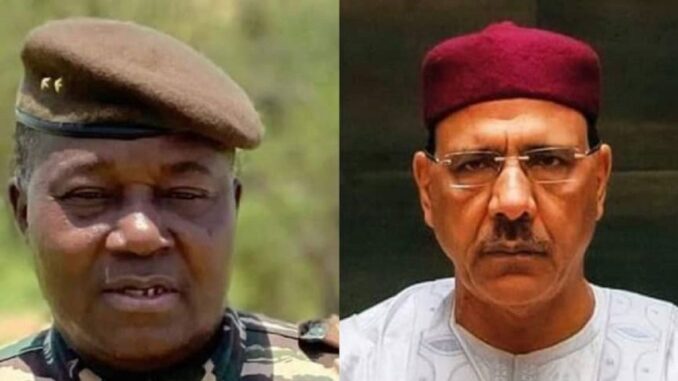
Worrying sociopolitical developments in the West coast of Africa have very understandably elicited subregional, continental and global concerns. Within the twinkle of an eye the gradual absorption of democratic governance consistent with contemporaneous global trends by countries in the subcontinent, has gone on the reverse gear.
A week ago Nigeria’s Northern neighbours, the Republic of Niger, became the latest of nearly half a dozen countries in West Africa where substantive democratically elected governments has been displaced by military voyeurs.
Assimi Goita, a 42 year old Colonel in the Malian army most probably flagged off this disturbing routine when he sacked President Malick Diaw from office May 28, 2021. It was his second venture into coup plotting having earlier been appointed Vice President after participating in an earlier subversive endeavour on September 21, 2020.
Goita reportedly received military training in the United States, France and Germany. Goite and Guinea’s Mamady Doumbouya a 43 year-old army Colonel reportedly met during a training programme organised by the U.S. army for West Africa’s “special forces commanders.” As though preplanned, Doumbouya like Goita led a coup d’etat on September 5, 2021 to unseat Alpha Conde as President of Guinea.
Doumbouya is said to have cited former President of Ghana, John Jerry Rawlings in defending his action. Rawlings was first a coupist in his country before his transmutation into a democrat. He was reported to have once said: “If the people are crushed by the elite, it is up to the army to give the people their freedom.” While Alpha Conde remains incarcerated, Doumbouya has consolidated himself as “interim president” with a pledge to conduct elections in 2025. He is said to have committed not to participate in the 2025 elections by leaving the space for politicians.
Burkina Faso joined the league of West African countries sidestepping democracy when on January 24, 2022, the second term of former President Roch Marc Christian Kabore was ousted. 42-years old Paul-Henri Sandaogo Damiba who overthrew Kabore was himself taken out on September 30, 2022 by a younger army officer, 35-years old Ibrahim Traore, a Captain. He has promised to hold democratic elections in July 2024. As though in martial choreography military officers in Niger Republic led by General Abdourahamane Tchiani, commander of the presidential guard on July 28, 2023, deposed President Mohammed Bazoum. The coupists cited escalating insecurity and economic stagnation as reasons for the takeover.
A common thread running through the lifeblood of all four countries presently in the grips of militarism in West Africa is that they are all former French colonies. In each instance they have very loudly denounced France which has been unanimously accused of the continuing underdevelopment of its former vassals. ECOWAS and the continental umbrella body of African nations, the African Union, (AU), has condemned the development unequivocally.
ECOWAS under the leadership of Nigeria’s President Bola Tinubu rose from a meeting in the Nigerian capital Abuja last weekend admonishing the coup plotters to reinstate the country’s constitution and Bazoum or face dire consequences which may include military intervention.
Nigeria which has always been a benefactor of many West African and African countries has disconnected electricity supply to Niger as part of punitive actions intended to inconvenience the putschists in Niamey. Instructively, Mali and Burkina Faso have already expressed willingness to take sides with Niger if ECOWAS practically rolls out the troops and tanks against their ally.
Nigeria’s North Eastern neighbour Chad Republic in Central Africa remains under military governance. Mahatma Deby son of former President Idris Deby Itno succeeded his father following his death on the frontlines in April 2021. A coup plot has just been foiled in recent days in Sierra Leone. Senior military officers suspected of complicity in the attempted coup were arrested by the police. Such is the cobweb of military rulership steadily emasculating democracy in West Africa and the proximate Central Africa. Such is the dilemma of African leaders.
It remains nauseous that the gains of hard-fought democracy in many West African countries is suddenly being threatened by a new generation of putschists. It is upsetting too the manner the trend is gaining traction and spreading like wild fire. While it remains necessary to talk tough and contemplate sanctions, outright military intervention in Niger or any country for that matter is ill-advised at a time like this. Any plausible military intervention by ECOWAS will predictably be led by Nigeria.
The country will contribute the bulk of the fighting forces, the arms, armaments and resources to fund the operation. Indeed Nigeria continues to bear the burden of funding ECOWAS and ensuring the functioning of the body.
To be continued tomorrow
Olusunle, PhD, poet, journalist, scholar and author is a member of the Nigerian Guild of Editors, (NGE).
END

Be the first to comment